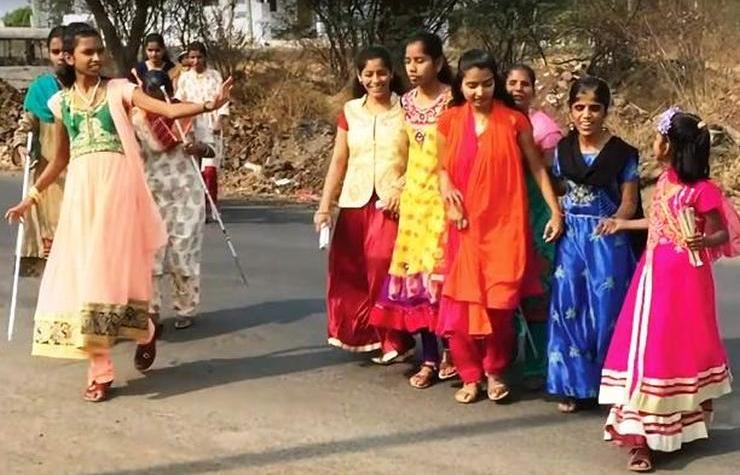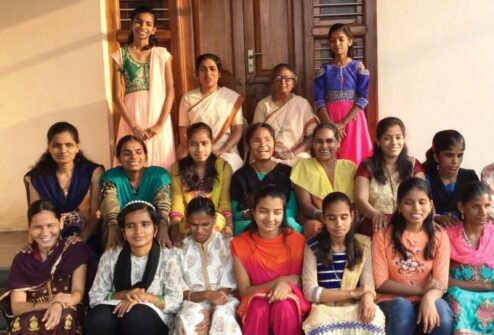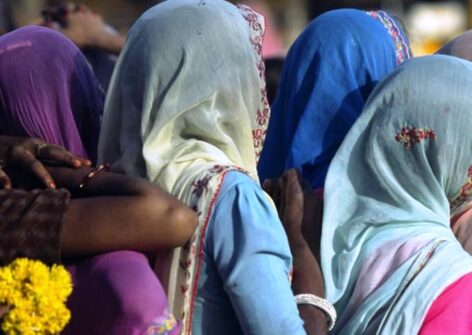India. At School with a Look of Love.

Sister Nancy Thomas recounts her experience at Nirmala Bhavan, an institution for blind girls in the Indian state of Karnataka.
The school where Sister Nancy Thomas, missionary of the Immaculate in India, has been working for twenty years is special: it is called Nirmala Bhavan and welcomes blind girls and young ladies aged 10 to 28 who, “aside from driving and painting – explains Sr Nancy – manage to do everything independently: they read and write in Braille, they pray, they wash the dishes, they learn to go around with a stick for the blind, they play various instruments and they dance”.
The school is located in the village of Athani in the southwestern Indian state of Karnataka. For reasons of caste and inheritance, families often marry off their daughters to first cousins. “Parents want land ownership to remain within the family and, as in all of India, prevent their children from marrying someone of a different caste”, explains Sister Nancy.
And she continues: “Children with disabilities, mental retardation or other problems are born from these marriages. Many are indeed blind and girls find themselves in a situation of greater insecurity than boys”.

The nun explains the main difficulty they find. She says: “Parents struggle to let someone else take care of their daughters because, in accordance with the Hindu tradition which believes in reincarnation, a disabled daughter is seen as a divine punishment. We go to the families and talk to them. We try to explain that it is not a divine punishment and that girls can have a future in school. Families usually calm down after visiting the school and are happy to see how we take care of their daughters”.Even though consanguineous marriages are a widespread practice among all social classes, the girls of the Nirmala Bhavan almost all come from backgrounds of poverty. Karnataka, in fact, unlike the neighbouring southern Indian states, is one of the poorest states in India.”All our girls ask for is that they be given an opportunity – continues Sister Nancy. Sometimes they are rejected by their families, but they don’t want compassion, they want to be able to study and work”. In fact, in state schools, disabled people are usually left in a corner and all they are given is food.
In the community, however, they learn to read, write, cook, clean, play, use computers and do handicrafts. “We are concerned with their physical and spiritual development”. Many girls who have graduated from school have now found employment and are working in IT companies, in the food sector and even in fashion. Sister Nancy proudly says, “One of our girls is on the national blind girls cricket team”.
“These girls have hope, they pray, and they thank us for being accepted and treated as human beings. Some tell us: ‘Without you, we could have died’ ”. Instead at Nirmala Bhavan, they got a second chance at life.

“They recognize us by our voice or by our smell – continues the nun. And they are extremely intelligent: as soon as they meet a new person, they remember them forever. They also have a high sensitivity: when we are ill, they worry about us, they tell us to go to the hospital because they are afraid that if we were to die, no one would take care of them anymore”.Even though they can’t see, the girls wear make-up for special occasions or when visitors arrive: “They want to look pretty because they know that others can see them”.
The presence of the Missionary Sisters of the Immaculate in Athani began in 2000 and a few years later the Nirmala Bhavan community was born. “Occasionally, people are suspicious and ask us what we are doing, but in general our presence is welcome”, says Sister Nancy.
The Bharatiya Janata Party, the ultra-nationalist Hindu party from which Prime Minister Narendra Modi comes, and which governs Karnataka, has so far never caused problems for the Sisters because the girls they take care of are all Hindus. “Only one or two girls are Christian”, explains Sister Nancy. The decision of the sister Nancy to devote herself to the consecrated life came at a young age. “One of my older sisters was already a nun – she explains – and when I saw her all dressed in white, she looked like an angel to me: I immediately wanted to be one too”. The missionary vocation arrived shortly after when during the last year of high school Sister Nancy attended a lesson on Father Damien, a Belgian missionary of the Congregation of the Sacred Hearts of Jesus and Mary who in the 19th century gave his life for lepers in Molokai.

But the missionary, who worked in other communities before arriving in Athani, had some difficulty in approaching the blind girls: “At first I would call them, expecting them to be able to reach me right away. But it’s not that simple for the blind. And they were very suspicious. It took me a while to get used to it and understand their feelings. To do that, you have to put yourself in their shoes”.
Concretely, and not just metaphorically, “You have to really understand what it was like to not see all the time. When I understood what it was like to live in the dark, I began to feel even more love and concern for them. Sometimes we are grumpy, unhappy, but when I look at these girls who are happy despite their condition, I can’t entertain negative feelings”, concludes Sr. Nancy.
Alessandra De Poli/MM



